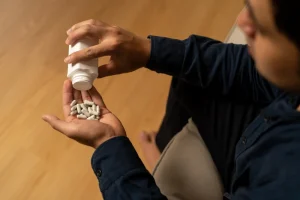
Taking time to look after yourself and do things you enjoy is vital to any recovery journey. One of the first signs of a future relapse is a lack of self-care, and letting people or things get you down to the point where you don’t have time for yourself could have serious consequences on your sobriety. In recovery, relapse prevention plays a vital role in maintaining sobriety and preventing setbacks.
Re-evaluate Your Treatment Plan

Learning to recognize triggers, getting help from a counselor, and building a support network are all useful tools in preventing a relapse. Do everything you can to protect yourself, but don’t beat yourself up if you do slip. Having someone to support in situations where you are at risk of relapse can help. Find someone you trust and respect to kindly, but firmly, persuade you to stop what you’re doing if you do start to relapse.
Types of Addiction Relapse
Withdrawal symptoms like nausea, shakiness, and sweating can be so difficult that you want to use drugs again just to stop them. Medications can help you manage withdrawal symptoms before they trigger a relapse. Focus on how much better your life will be once you stop using drugs or alcohol for good. Think about what to do after a relapse what’s driving you to quit, such as rebuilding damaged relationships, keeping a job, or getting healthy again. Even if you survive, an overdose can leave you and your family members with lots of feelings to sort through. Consider talking to someone, such as a counselor or people in your support group.
Social Withdrawal
- Addiction relapse is by no means an uncommon occurrence, and many addiction treatment programs offer guidance for people who have relapsed or are in danger of doing so.
- Most physical relapses are considered relapses of opportunity, meaning that they occur when an individual feels they will not get caught.
- MBRP integrates mindfulness practices with a cognitive-behavioral approach to help individuals develop awareness of cravings without reacting spontaneously.
- The UK government’s guidelines emphasize the importance of both short-term and long-term medication strategies to enhance the benefits of treatment and reduce the risk of relapse.
- Take some time to explore the thoughts, emotions, and circumstances leading to the relapse.
Monitoring involves regularly assessing goals, strategies, and coping mechanisms to ensure they remain effective and relevant. If certain approaches no longer serve their purpose or new challenges emerge, people can collaborate with their support system. Building a support network is like building a safety net for your journey to sobriety. It’s https://ecosoberhouse.com/ about surrounding yourself with people who uplift and encourage you, especially during tough times. Take some time to explore the thoughts, emotions, and circumstances leading to the relapse. Self-reflection can help you identify any underlying issues that need to be addressed and develop strategies for coping with triggers more effectively.

Warning Signs and Stages of a Relapse
- Instead of sitting down with some self-help books, you would be better off doing whatever you can to distract yourself.
- A single use is usually referred to as a “slip.” Some people can slip without relapsing, but drinking or using increases the chance of relapse.
- The hospital argues that they did provide physical, occupational and psychological therapy to Maya Kowalski, which are known to be treatments that help with CRPS.
- The CARESS process offers a positive, practical way to sidestep old destructive patterns and create new, productive ones that actually help manage trauma and addiction.
- Sleep regulates and restores every function of the human body and mind.
In the realm of addiction, relapse has a more specific meaning—a return to substance use after a period of nonuse. Whether it lasts a week, a month, or years, relapse is common enough in addiction recovery that it is considered a natural part of the difficult process of change. Between 40 percent and 60 percent of individuals relapse within their first year of treatment, according to the National Institute on Drug Abuse. Relapse in addiction is of particular concern because it poses the risk of overdose if someone uses as much of the substance as they did before quitting. Different types of treatment programs offer various levels of care to meet you where you are in your recovery process. Though relapse can be a traumatic experience, it gives you the opportunity to learn about yourself, your disease and what’s required to take back control.
- For some reason, you decide that participating in your recovery program is just not as important as it was.
- Engaging in hobbies and pastimes that bring joy can act as a positive distraction, reducing the risk of relapse by filling the time with fulfilling pursuits.
- Often relapse occurs because of a combination of these and other reasons.
- People in this stage should learn to recognize and avoid high-risk situations.
- Make sure the people closest to you know where to find it and how to use it.
- Ever find yourself returning to alcohol after weeks or months of sobriety?

Your article helped me a lot, is there any more related content? Thanks!
В этом интересном тексте собраны обширные сведения, которые помогут вам понять различные аспекты обсуждаемой темы. Мы разбираем детали и факты, делая акцент на важности каждого элемента. Не упустите возможность расширить свои знания и взглянуть на мир по-новому!
Углубиться в тему – https://medalkoblog.ru/
стоимость натяжного потолка за квадратный метр [url=https://potolkilipetsk.ru/]potolkilipetsk.ru[/url] .
стоимость натяжного потолка цена [url=https://potolkilipetsk.ru/]potolkilipetsk.ru[/url] .
натяжной потолок под ключ [url=www.potolkilipetsk.ru]натяжной потолок под ключ[/url] .
стоимость натяжного потолка с установкой [url=http://potolkilipetsk.ru/]http://potolkilipetsk.ru/[/url] .
стоматология скидки [url=https://stomatologiya-vladimir-2.ru/]https://stomatologiya-vladimir-2.ru/[/url] .
посчитаем кухонный гарнитур [url=http://kuhnni-na-zakaz1.ru]http://kuhnni-na-zakaz1.ru[/url] .
ролетный шкаф в паркинг [url=http://shkaf-parking-3.ru/]ролетный шкаф в паркинг[/url] .
сколько стоит септик [url=www.septik-pod-klyuch-1.ru]сколько стоит септик[/url] .
кредит онлайн без документов [url=infor.kz/stati/biznes-reklama-finansy/podbiraem-gramotno-bank-v-kyrgyzstane.html]infor.kz/stati/biznes-reklama-finansy/podbiraem-gramotno-bank-v-kyrgyzstane.html[/url] .
плохая кредитная история можно ли взять кредит [url=www.kredity-plohoj-ki-1.ru/]плохая кредитная история можно ли взять кредит[/url] .
кредит онлайн с 18 лет без отказа [url=https://www.kredit-bez-otkaza-1.ru]кредит онлайн с 18 лет без отказа[/url] .
быстро займ на карту онлайн круглосуточно без отказа [url=http://zajm-bez-otkaza-1.ru/]быстро займ на карту онлайн круглосуточно без отказа[/url] .
купить кухонный гарнитур угловой московская область [url=www.uglovyye-kukhni-na-zakaz-1.ru]купить кухонный гарнитур угловой московская область[/url] .
клиника нижний новгород психолог стационар [url=http://psihiatry-nn-1.ru]http://psihiatry-nn-1.ru[/url] .
горшок кашпо для цветов купить напольное [url=http://kashpo-napolnoe-spb.ru/]горшок кашпо для цветов купить напольное[/url] .
кашпо для цветов напольное высокое пластиковое [url=https://www.kashpo-napolnoe-spb.ru]https://www.kashpo-napolnoe-spb.ru[/url] .
муравьиная ферма вместе с муравьями [url=www.kupit-muravinuyu-fermu-1.ru/]муравьиная ферма вместе с муравьями[/url] .
аренда экскаватора с оператором [url=http://arenda-ehkskavatora-1.ru]аренда экскаватора с оператором[/url] .
интернет магазин напольных горшков для цветов [url=www.kashpo-napolnoe-spb.ru/]www.kashpo-napolnoe-spb.ru/[/url] .
cl?nica de cosmetolog?a en Espa?a [url=http://www.clinics-marbella-1.com]http://www.clinics-marbella-1.com[/url] .
напольные вазоны для комнатных цветов [url=http://kashpo-napolnoe-msk.ru/]напольные вазоны для комнатных цветов[/url] .
лазерная косметология цены [url=https://clinics-marbella-1.ru/]лазерная косметология цены[/url] .
декоративный горшок напольный для цветов [url=http://kashpo-napolnoe-rnd.ru]декоративный горшок напольный для цветов[/url] .
горшок напольный высокий современный [url=http://kashpo-napolnoe-rnd.ru/]http://kashpo-napolnoe-rnd.ru/[/url] .
стоматология цены [url=http://stomatologiya-arhangelsk-1.ru/]стоматология цены[/url] .
песчаный багги [url=http://baggi-1-1.ru]http://baggi-1-1.ru[/url] .
построить дом под ключ [url=https://stroitelstvo-doma-1.ru/]построить дом под ключ[/url] .
стоимость ремонта однокомнатной квартиры [url=remont-kvartir-pod-klyuch-1.ru]remont-kvartir-pod-klyuch-1.ru[/url] .
займ на карту срочно [url=http://zajm-kg.ru/]займ на карту срочно[/url] .
вклады [url=https://www.deposit-kg.ru]вклады[/url] .
займ онлайн на карту круглосуточно [url=https://zajm-kg-3.ru/]займ онлайн на карту круглосуточно[/url] .
авто из кореи в спб под ключ [url=https://avto-iz-korei-1.ru/]авто из кореи в спб под ключ[/url] .
прикольные цветочные горшки [url=http://dizaynerskie-kashpo-sochi.ru]прикольные цветочные горшки[/url] .
кредитный карта [url=https://www.kreditnye-karty-kg-1.ru]кредитный карта[/url] .
автокредит под новый автомобиль [url=http://www.avtocredit-kg-1.ru]автокредит под новый автомобиль[/url] .
прикольные кашпо [url=http://www.dizaynerskie-kashpo-sochi.ru]прикольные кашпо[/url] .
стильные горшки для цветов [url=www.dizaynerskie-kashpo-rnd.ru]стильные горшки для цветов[/url] .
кашпо оригинальное купить [url=www.dizaynerskie-kashpo-nsk.ru]кашпо оригинальное купить[/url] .
стильные горшки для цветов [url=http://dizaynerskie-kashpo-nsk.ru]стильные горшки для цветов[/url] .
apparatus cosmetology clinic Marbella [url=http://cosmetology-in-marbella.com]apparatus cosmetology clinic Marbella[/url] .
цены процедур в косметологии [url=http://www.kosmetologiya-krasnoyarsk-1.ru]цены процедур в косметологии[/url] .
горшки с автополивом для комнатных [url=http://kashpo-s-avtopolivom-kazan.ru/]горшки с автополивом для комнатных[/url] .
Your article helped me a lot, is there any more related content? Thanks! https://www.binance.com/join?ref=IJFGOAID
стильные кашпо для цветов [url=dizaynerskie-kashpo-rnd.ru]стильные кашпо для цветов[/url] .
горшок с автополивом купить [url=http://kashpo-s-avtopolivom-kazan.ru]горшок с автополивом купить[/url] .
Well done! Keep up this quality!
Good day! This is my first comment here so I just wanted to give a quick shout out and say I really enjoy reading through your articles. Can you recommend any other blogs/websites/forums that cover the same subjects? Thanks a lot!
горшки с автополивом для комнатных растений [url=https://www.kashpo-s-avtopolivom-spb.ru]горшки с автополивом для комнатных растений[/url] .
услуги центр косметологии [url=www.kosmetologiya-novosibirsk-1.ru/]услуги центр косметологии[/url] .
услуги косметолога цена [url=https://kosmetologiya-moskva-1.ru]https://kosmetologiya-moskva-1.ru[/url] .
горшки с автополивом для комнатных растений купить [url=https://kashpo-s-avtopolivom-spb.ru]https://kashpo-s-avtopolivom-spb.ru[/url] .
уличное кашпо для цветов напольное [url=ulichnye-kashpo-kazan.ru]уличное кашпо для цветов напольное[/url] .
система мониторинга транспорта глонасс оборудование [url=www.monitoring-ts-1.ru/]система мониторинга транспорта глонасс оборудование[/url] .
зеркала белые цена [url=http://zerkalo-nn-1.ru/]зеркала белые цена[/url] .
The sketch is tasteful, your authored material stylish.
большие кашпо для улицы [url=http://www.ulichnye-kashpo-kazan.ru]большие кашпо для улицы[/url] .
кашпо высокое напольное купить [url=https://www.kashpo-napolnoe-moskva.ru]кашпо высокое напольное купить[/url] .
Regards for helping out, superb info.
гранулятор для вспененного полиэтилен [url=http://granulyatory-1.ru/]гранулятор для вспененного полиэтилен[/url] .
компрессорный завод [url=https://kompressornyj-zavod-1.ru]компрессорный завод[/url] .
горшок напольный [url=https://www.kashpo-napolnoe-moskva.ru]горшок напольный[/url] .
кашпо под цветы напольные [url=https://kashpo-napolnoe-krasnodar.ru/]кашпо под цветы напольные[/url] .
Hi, I just hopped over to your web-site through StumbleUpon. Not somthing I might typically browse, but I liked your views none the less. Thanks for making something worthy of reading through.
Our community leaders need to read this, and look at developing some of your recommendations.
Peculiar this blog is totaly unrelated to what I was searching for – – interesting to see you’re well indexed in the search engines.
кондиционеры обнинск [url=https://kondicioner-obninsk-1.ru]кондиционеры обнинск[/url] .
натяжные потолки купить липецк [url=https://natyazhnye-potolki-lipeck-1.ru]натяжные потолки купить липецк[/url] .
Thanks for a Interesting item; I enjoyed it very much. Regards Sang Magistrale
Great resources and tips for families here.
xx88 là sân chơi cá cược đẳng cấp hàng đầu Châu Á. Sở hữu kho game trực tuyến đa dạng từ: xổ số, casino, thể thao,… Tải App để tham gia trải nghiệm mượt …
игольчатый рф лифтинг шеи [url=http://rf-lifting-moskva.ru]игольчатый рф лифтинг шеи[/url] .
стоматолог [url=stomatologiya-voronezh-1.ru]стоматолог[/url] .
оригинальные кашпо горшки для цветов [url=http://www.dizaynerskie-kashpo-nsk.ru]http://www.dizaynerskie-kashpo-nsk.ru[/url] .
Spot on with this write-up, I truly believe this website requirements a lot much more consideration. I’ll probably be once more to read much much more, thanks for that info.
Thank you for this great piece of content. Best Regards
Can you be more specific about the content of your article? After reading it, I still have some doubts. Hope you can help me.
интересные кашпо для цветов [url=dizaynerskie-kashpo-rnd.ru]dizaynerskie-kashpo-rnd.ru[/url] .
I was suggested this website by my cousin. I am not sure whether this post is written by him as no one else know such detailed about my difficulty. You are wonderful! Thanks!
I am glad to be one of the visitors on this great site (:, appreciate it for putting up.
It’s clear you’re passionate about the issues.
Tips and tools you offer are so helpful to agencies in our community.
Thanks for another great post. Where else may anybody get that type of info in such an ideal way of writing? I have a presentation next week, and I’m at the search for such information.
This article actually helped me with a report I was doing.
горшки с автополивом для комнатных растений купить [url=www.kashpo-s-avtopolivom-kazan.ru/]www.kashpo-s-avtopolivom-kazan.ru/[/url] .
Spot on with this write-up, I truly believe this website requirements a lot much more consideration. I’ll probably be once more to read much much more, thanks for that info.
Эта статья предлагает уникальную подборку занимательных фактов и необычных историй, которые вы, возможно, не знали. Мы постараемся вдохновить ваше воображение и разнообразить ваш кругозор, погружая вас в мир, полный интересных открытий. Читайте и открывайте для себя новое!
Углубиться в тему – https://quick-vyvod-iz-zapoya-1.ru/
There is a lot of misunderstanding about these issues today. Your material helps explain things.
горшок для растений с автополивом [url=http://kashpo-s-avtopolivom-spb.ru/]http://kashpo-s-avtopolivom-spb.ru/[/url] .
кашпо уличные большие [url=https://ulichnye-kashpo-kazan.ru/]кашпо уличные большие[/url] .
Thanks for sharing the information. I found the information very useful. That’s a awesome story you posted. I will come back to scan some more.
Substantially, the post is really the best on this laudable topic. I concur with your conclusions and will eagerly watch forward to your future updates.Just saying thanx will not just be enough, for the wonderful lucidity in your writing.
A friend of mine advised this site. And yes. it has some useful pieces of info and I enjoyed scaning it. Therefore i would love to drop you a quick note to express my thank. Take care
hey thanks for the info. appreciate the good work
Some truly nice stuff on this website , I like it.
I just couldn’t leave your website before suggesting that I really enjoyed the usual information an individual supply on your visitors? Is gonna be back often in order to investigate cross-check new posts
Substantially, the post is really the best on this laudable topic. I concur with your conclusions and will eagerly watch forward to your future updates.Just saying thanx will not just be enough, for the wonderful lucidity in your writing.
I truly appreciate this post. I have been looking everywhere for this! Thank goodness I found it on Bing. You have made my day! Thank you again
If you are looking to post free classifieds in India online, we highly recommend Xpdea Classifieds. Xpdea is India’s leading free online ads posting site.
I really like your writing style, excellent info , thanks for putting up : D.
I really like your writing style, excellent info , thanks for putting up : D.
If you are looking to post free classifieds in India online, we highly recommend Xpdea Classifieds. Xpdea is India’s leading free online ads posting site.
If you are looking to post free classifieds in India online, we highly recommend Xpdea Classifieds. Xpdea is India’s leading free online ads posting site.
If you are looking to post free classifieds in India online, we highly recommend Xpdea Classifieds. Xpdea is India’s leading free online ads posting site.
If you are looking to post free classifieds in India online, we highly recommend Xpdea Classifieds. Xpdea is India’s leading free online ads posting site.
While this issue can vexed most people, my thought is that there has to be a middle or common ground that we all can find. I do value that you’ve added pertinent and sound commentary here though. Thank you!
A wholly agreeable point of view, I think primarily based on my own experience with this that your points are well made, and your analysis on target.
Γεια χαρά σε όλους! Εδώ είμαστε πάλι, η ομάδα των ειδικών, για να βουτήξουμε σε ένα θέμα που καίει πολλούς παίκτες στην Ελλάδα: ποιές ξένες στοιχηματικές εταιρίες δέχονται τους παίκτες από την χώρα μας ελεύθερα, χωρίς VPN και γρήγορες πληρωμές; Έχουμε περάσει ώρες ατελείωτες δοκιμάζοντας διάφορες πλατφόρμες τζόγου, διαβάζοντας ψιλά γράμματα και μιλώντας με ομάδα υποστήριξης, για να σας δώσουμε την ξεκάθαρη εικόνα για το τι παίζει σε αυτές τις πλατφόρμες πραγματικά.
This article actually helped me with a report I was doing.
Nice blog. Could someone with little experience do it, and add updates without messing it up? Good information on here, very informative.
This is my first time i visit here. I found so many helpful stuff in your website especially its discussion. From the tons of responses on your posts, I guess I am not the only one having all the enjoyment here! keep up the excellent work
I found your blog through google and I must say, this is probably one of the best well prepared articles I have come across in a long time. I have bookmarked your site for more posts.
I’ve been surfing online more than 3 hours today, yet I never found any interesting article like yours. It’s pretty worth enough for me. In my view, if all web owners and bloggers made good content as you did, the net will be much more useful than ever before.
Rynek kasyn online w Polsce charakteryzuje się szybkim wzrostem Młodzi dorośli korzystający z urządzeń mobilnych napędzają wzrost popularności kasyn online oferujących bonus powitalny. Totalizator Sportowy posiada monopol, regulowany na mocy Ustawy o Grach Hazardowych z 2009 roku, a Total Casino jest wiodącą platformą. Konkurencyjny krajobraz obejmuje krajowych i zagranicznych operatorów posiadających licencje z UE. Zaawansowane technologie, takie jak integracja z krupierami na żywo i optymalizacja mobilna, poprawiają doświadczenia użytkowników, podczas gdy wybór kasyna online staje się coraz bardziej złożony inicjatywy odpowiedzialnego hazardu zyskują na znaczeniu. Dowiedz się więcej o dynamice rynku i przyszłych perspektywach.
Its just like you read my thoughts! It’s like reading about my family.
Sometimes, the sheer magnitude of the information seems overwhelming.
have already been reading ur blog for a couple of days. really enjoy what you posted. btw i will be doing a report about this topic. do you happen to know any great websites or forums that I can find out more? thanks a lot.